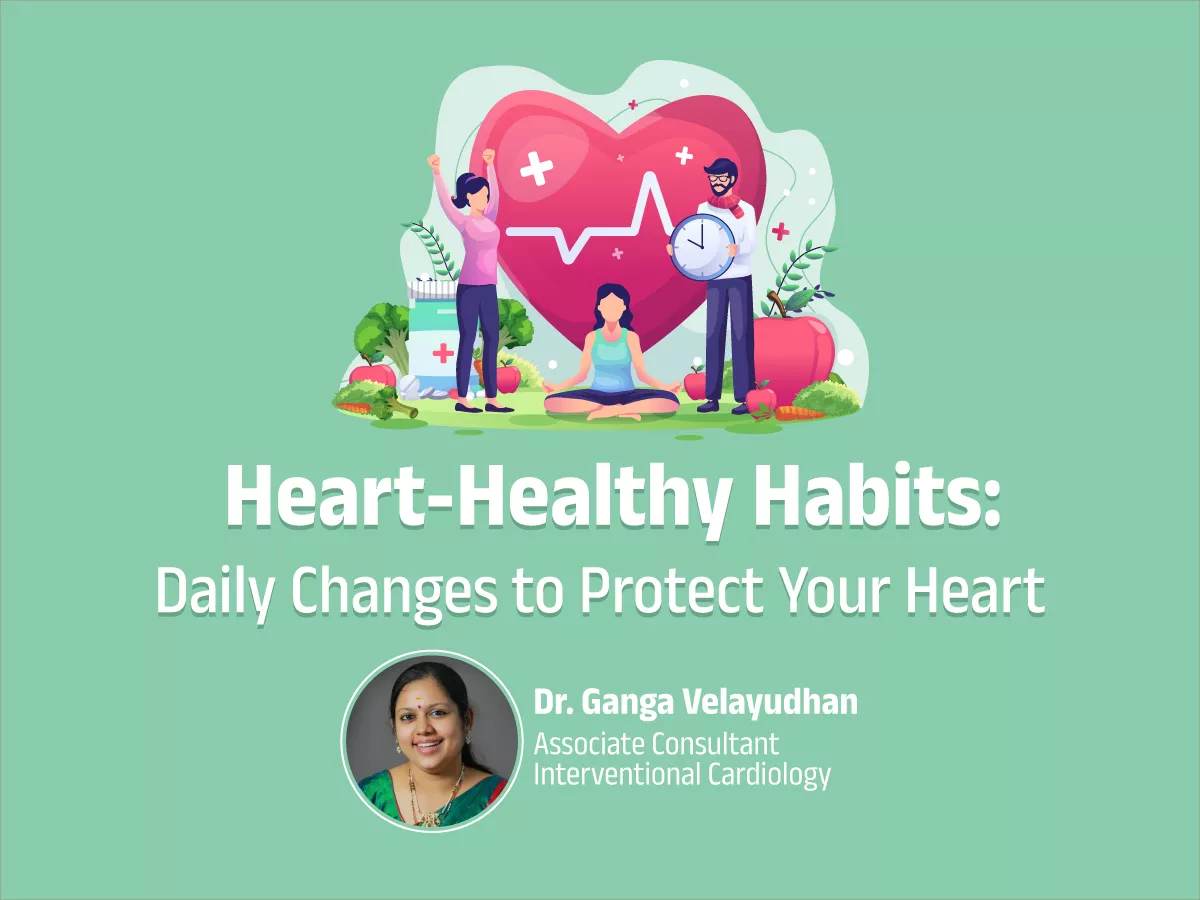Your heart is one of the most vital organs in your body, and taking care of it is essential for a long and healthy life. Heart healthy living involves understanding your risk making healthy chances and taking steps to reduce your chances of getting heart diseases.
Small, changes can have a big impact on your heart health. By focusing on simple lifestyle changes like diet, exercise, and stress management, you can significantly reduce your risk of heart disease and improve your overall well-being.
Here's how:
1. Eat Smart: Fuel Your Heart with Healthy Foods
What you eat plays a crucial role in maintaining heart health. Making smarter choices in your diet doesn't have to be complicated:
- Choose Whole Grains: Swap refined grains for whole grains like brown rice, oats, and whole wheat. Whole grains are rich in fiber, which helps reduce cholesterol levels and supports a healthy heart.
- Increase Fruits and Vegetables: Fill half your plate with a variety of colorful fruits and vegetables. They're packed with vitamins, minerals, and antioxidants that help protect your heart.
- Healthy Fats Matter: Opt for unsaturated fats found in nuts, seeds, avocados, and olive oil. These fats can lower bad cholesterol (LDL) and increase good cholesterol (HDL), reducing your risk of heart disease. Avoid trans fats and limit saturated fats found in fried foods and processed snacks.
- Cut Down on Salt and Sugar: Too much salt raises blood pressure, a major risk factor for heart disease. Reduce your sodium intake by cutting back on processed foods and using herbs and spices instead of salt to season meals. Limiting sugary drinks and sweets will help prevent obesity and diabetes, both of which put extra strain on your heart.
2. Get Moving: Exercise for a Stronger Heart
Regular physical activity is one of the most effective ways to strengthen your heart and improve cardiovascular health. The good news? You don’t need to run a marathon to see benefits.
- Aim for 30 Minutes a Day: Just 30 minutes of moderate exercise, such as brisk walking, cycling, or swimming, five days a week can significantly lower your risk of heart disease. If you can’t do it all at once, break it into 10- or 15-minute sessions throughout the day.
- Incorporate Strength Training: Lifting weights or doing bodyweight exercises like push-ups and squats helps maintain muscle mass, which in turn boosts your metabolism and supports heart health.
- Stay Active in Daily Life: Look for ways to move more throughout the day. Take the stairs instead of the elevator, walk or bike to work, or take a quick stroll during lunch breaks. Every little bit of movement adds up and contributes to heart health.
3. Manage Stress: A Calm Mind for a Healthy Heart
Chronic stress can take a toll on your heart, increasing blood pressure and inflammation, both of which contribute to cardiovascular issues. Managing stress is key to keeping your heart healthy.
- Practice Mindfulness or Meditation: Setting aside even a few minutes each day to meditate, practice deep breathing, or engage in mindfulness exercises, journaling can help reduce stress levels and improve your mood.
- Stay Connected: Strong social connections and spending time with loved ones have been shown to lower stress and promote heart health. Whether it's talking with friends or enjoying quality family time, social support is important.
- Prioritize Sleep: A good night’s rest is vital for heart health. Aim for 7-9 hours of quality sleep each night. Poor sleep can contribute to high blood pressure, obesity, and other risk factors for heart disease.
4. Quit Smoking and Limit Alcohol
Smoking is one of the most harmful habits for your heart, drastically increasing the risk of heart attack and stroke. Quitting smoking greatly lower your risk of having more heart attacks or dying from heart disease.
- Seek Support: There are many resources available, from nicotine replacement therapies to counselling, that can help you quit smoking for good. Don’t be afraid to ask for help—it’s worth it for your heart and overall health.
- Moderate Alcohol Consumption: While some studies suggest moderate alcohol consumption (one drink a day for women, two for men) may have heart benefits, excessive drinking leads to high blood pressure, heart failure, and other heart-related issues. Limiting alcohol or abstaining altogether is the safest bet for a healthy heart.
5. Stay Hydrated
Drinking plenty of water is often overlooked, but it’s crucial for heart health. Staying hydrated helps maintain healthy blood pressure and ensures that your heart doesn't have to work harder to pump blood. It may help to reduce long term risk for heart diseases.
Conclusion
Maintaining a heart-healthy lifestyle doesn’t require drastic changes; small daily habits can make a big difference. By adopting a balanced diet, staying active, managing stress, quitting smoking, and staying hydrated, you can protect your heart and enjoy a healthier, more vibrant life. Your heart will thank you!





